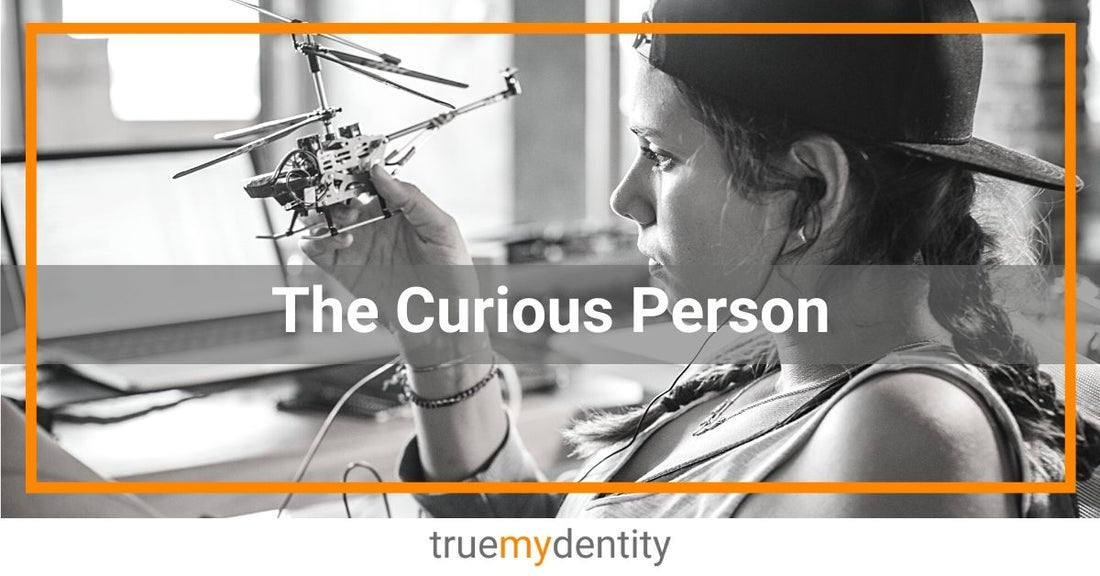
Being a Curious Person | 7 Tips on How to be More Curious
Luke FeldbruggeShare
To be a curious person who is brave enough to explore, investigate and learn by asking not only the right questions but the hard questions; to ponder with genuine interest and intrigue; to pursue a deeper understanding or creative solution; is incredibly powerful. In this post we look at the 9 positive characteristics of people who are generally more curious than most. We cover the importance of being a curious person throughout your learning, your career, and how your curiosity can play a beneficial role in your relationships. Plus, we provide seven helpful tips on how to be more curious if you’re looking to kick your curiosity up a notch!
What Does Curious Mean?
Merriam-Webster's CURIOUS definition (adjective for a person) is: having the desire to investigate and learn; inquisitive interest.
True Mydentity prefers to add a sprinkle of salt for a bit more flavor.
The curious person pursues answers; facts, theories, different perspectives and even questions the unknown. Who, what, where, when, why, and of course we cannot forget, how?
Truly, everybody is curious. It’s in our genetic makeup to naturally explore; to discover and apply definition to things. Watch a baby interact with their surroundings; wide-eyed, trying to touch anything and everything. If they can reach something and pick it up, it goes in their mouth.
We are naturally wired to be explorers, investigators and knowledge seekers. Some find the pursuit of new things and different perspectives to be more interesting than others. These highly curious people help to navigate where we go next, what we build next, what we discover next, and what we define next.
In a sense, being curious has helped lay the foundation of human society as we know it today; and it is currently defining what our future will look like tomorrow. In a fast, ever-changing world where adaptability is essential, your curiosity may be part of the driving force behind the future success of humanity.
Complete our free questionnaire and find out if being curious is one of your most dominant character traits, and which of the other 58 traits are also your most powerful qualities.
9 Positive Characteristics of the Curious Person
- Brave - The curious person needs to have a brave side to ask the question (respectively) when others are certain of their direction, yet there seems to be misunderstanding.
- Confident - Being curious is basically admitting you do not know something, but would like to learn about it. It takes confidence (and bravery) to admit ignorance, even when it is in pursuit of knowledge.
- Cooperative - The curious person who enjoys socializing likely works well with others. Working with people (a favorite subject of curiosity) to ask questions (triggered by curiosity) to find a solution for an issue is a fitting character trait.
- Creative - The curious person, creative thinking and imagination often dance together. Curiosity is often the instigator, the catalyst, and the performance may not conclude until something has been created to answer the question.
- Empathetic - The curious person generally wants to better understand people. As their curiosity drives them to learn more about themselves and others through experiences, they build a stronger ability to share the feelings of another person.
- Intelligent - The curious person realizes there’s much more to the iceberg below the surface of the water. They look to discover the who, what, when, where, why and how of things; and pursue new perspectives and solutions. This fascination and initiative to better understand things can stimulate brain activity, and improve problem solving abilities and memory recall.
- Motivated - Why? Why? Why? How come? Can’t forget the, “How come?” The curious individual is motivated to know why; to understand. There’s more information in the universe than the human mind could ever fully comprehend given what we know today, but that doesn’t stop the curious one.
- Open-Minded - Curious people are willing to consider things from all sides; especially new ideas or new ways of thinking.
- Perceptive - Through their uncanny ability to ask questions and uncover answers, curious people often build up the insight and understanding that many others may not realize or comprehend.
Importance of Curiosity
If curiosity killed the cat, why ask why?
It turns out our natural instinct to explore and inquire is beneficial on many levels. First, it is a key to learning. Yes, understood. But, there are also benefits to curiosity for our mental, physical and emotional well being. It encourages us to participate and get actively involved. To pursue new levels of achievement and success in our personal lives and at work. Being curious also helps us gain new insight from other people; building our empathy and understanding of different cultures, perspectives and opinions.
Be Curious in Your Learning
Curiosity drives us to explore. If the only truth in the world is, “this too shall change,” then we must constantly adapt to change. Being curious is fundamental to learning and eventually understanding how to adapt to a changing world. Anytime we feel pleasure or excitement from a new discovery or experience, our brains are hardwired with a reward system that releases pleasure chemicals, like dopamine. Our brain literally encourages us to be curious, to try new things, and question our world in the interest of adaptation and survival.
Fostering curiosity in someone often leads to higher interest levels, more engagement, and encourages the individual to participate and contribute. Triggering interest and encouraging participation improves the likelihood of learning new skills and remembering what they (student, employee, partner) experienced.
One question can be answered many different ways. Sometimes the answer given is what you were looking for to improve your understanding, but the answer completely missed the mark for someone else’s understanding. Therefore how the question is asked, worded and/or presented, will be deciphered differently by curious people.
If you are an educator, industry leader, or anyone with ambition toward improving their own practice of questioning; or teaching others the skill of how to ask effective questions; the Right Question Institute has a free Question Formulation Technique (QFT) guide. You will need to register on their site, but then you can download a powerpoint template or PDF resource. It was created for educators, but can be used in any group setting to practice how to formulate questions.
Curiosity at Work
Here’s some curiosity at work: Does your job exist because of curious people? Like every idea, invention or breakthrough; they all started from curious minds who asked the questions and pursued the answers. As the original curious thought grew; things progressed, the amount of work increased, and the type of work became more diversified. This is when a curious thought becomes an entity that employs people, and when another curious person asks the question, “Should we hire someone to do this work for us?” Then, they hire a talent like you. All of this was built from one thought; likely originated from one person’s curiosity and imagination. It’s amazing just how powerful and impactful curiosity can be when it’s acted upon.
Whether you’re in a leadership position or not, simply understanding the importance of curiosity at work and using your curious nature to embrace curiosity, will help to build a culture that nurtures it and uses it effectively. Because when employees are encouraged to be curious, to ask questions, they take time to contemplate and consider different perspectives. This can lead to better decision making and/or more creative solutions.
Encouraged curiosity at work can also improve collaboration and better communication between people, teams and departments. When everyone is hungry to learn about the same thing to solve the same problems; things become more clear, efficient and rewarding for all involved. Questions and answers are more accepted as part of the process instead of being seen as antagonistic, troublesome or a burden. Addressing employee questions establishes better clarity and understanding. This helps employees feel part of the process and helps to better define how their role plays a part in the performance and success of it.
Be Curious in Relationships
The curious person typically enjoys socializing. Their curious nature and skill in asking questions will eventually lead to answers that provide insight on shared commonalities, and emotional responses regarding what the other person likes or dislikes. In new relationships, this tends to help the interaction and engagement become more comfortable faster. Both people tend to let their guard down a bit and share more openly; likely leading to a more enjoyable experience together.
Curious people tend to be easier to get along with. Because they’re curious, they tend to be less self-involved and more open to learning about their partner, their children, family members, friends, and any other new relationships that may arise. They want to genuinely learn about the other person in the relationship. Their curiosity will continue to motivate them to discover new things about the other person, or to experience and explore different things together. This keeps things lively, engaging and exciting; not stuck in the boring or mundane.
Being curious helps avoid conflict in relationships. To be curious, one must be willing to look at things from different perspectives. In a relationship there are at least two perspectives that need to be considered. The curious person has a tendency to realize this and actively attempts to understand the other person’s perspective. Their curious nature of looking at things from different perspectives helps to avoid placing judgment on other people and can help avoid conflict in the relationship.
7 Tips on How to be More Curious
- Be the Rookie: Imagine you are the new player. You only know what you bring to the table. As you begin to dig into things, you discover what you’ve learned over time may be questioned and put to the test. How to be more curious is to view everything as a new and exciting opportunity to learn; to improve your skills and grow your knowledge.
- Talk to People: Humans are complex and extraordinary. If the human brain can identify an image in as little as 13 milliseconds, imagine how much information one’s mind has processed in its lifetime! It is loaded with personal opinions, perspectives and findings. And, the stories people share with each other are clips of these from one’s own experiences. Some of which may be similar to your own; others may be completely contradictory. This is when things can get really interesting. Mutually respectful conversations with other people who are willing to share AND listen can be an absolute playground for the curious person.
- Try New or Different Experiences: Get outside your comfort zone and try new things; or do something you typically do, differently. If there is something you’ve always wanted to try but haven’t for some reason, commit and put it on the calendar (this makes it more likely to happen). Switch things up in your routine; like taking a different route to work, or eating with the opposite hand. But, it’s not about just doing something. The key to all of this is to “Be the Rookie” and take the opportunity to observe this new or different experience with your five senses (sight, sound, hearing, taste and touch) wide open.
- Ask Questions: If you do not know the answer, ask the question. Nobody knows everything, therefore everyone should ask questions. Sure, you can ask Google or Alexa. But when you can, take advantage of the people around you. They provide a unique perspective, and may offer valuable insight above and beyond the answer to your question. They may even open more doors of possibility.
- Ask Follow Up Questions: Sometimes the answer given does not provide the clarity you are seeking. Ask the follow up questions until your curiosity is satisfied and you’ve reached a comfortable understanding of the subject matter. Remember, how you ask your question will partially determine the answer you receive. A great skill to practice is how to ask the right questions. The Right Question Institute has a free Question Formulation Technique (QFT) guide. You will need to register on their site, but then you will be given access to their powerpoint template and a PDF. This is primarily for educators but it can be used for any individual or group learning.
- Understand Things Change: What you’ve learned, you may need to re-learn. What you knew yesterday could literally change tomorrow. The acceleration of innovative technology, and our access to overwhelming amounts of information has provided us with countless opportunities. We are discovering new things, building new solutions to problems, and answering questions that were previously unanswerable. It’s important to try and stay informed, and even more to ask questions if you understand something differently.
- Dig Deeper: Basically, if people are involved, there is likely more to the story. How to be more curious is to not take things at face value. People tend to keep things on the surface instead of really digging into emotions, opinions, endless little things, and all the happenings that actually create outcomes. A good example are news media groups. They only have so much time to cover a story, so you’re getting the extremely high level Cliff Notes version. If you want to know more, you will need to dig deeper.
Curious - True Mydentity Style
True Mydentity offers designs on our clothes that highlight 58 positive character traits. The powerful curious trait is one of the 58 character traits featured. We believe if you know your dominant positive characteristics, and focus on what you do to learn, work and build relationships using these dominant traits, you will feel more fulfilled and closer to your purpose. And as you improve upon leveraging these positive character traits in your learning, work and relationships; you move toward discovering your full potential.
Reinforce the power of your most dominant character traits. If you are a curious person, proclaim it with True Mydentity apparel; comfortably casual for the authentic and empowered.
VIEW CURIOUS APPAREL COLLECTION >>
Complete the questionnaire and find out which of the 58 traits are your most dominant.



